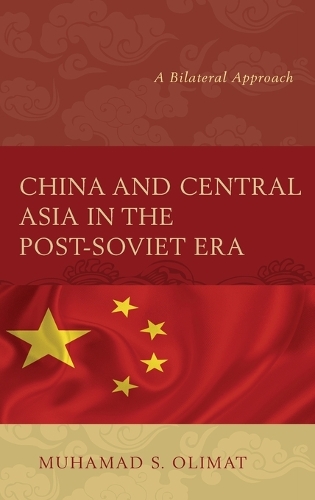
China and Central Asia in the Post-Soviet Era: A Bilateral Approach
(Hardback)
Available Formats
Publishing Details
China and Central Asia in the Post-Soviet Era: A Bilateral Approach
By (Author) Muhamad S. Olimat
Bloomsbury Publishing PLC
Lexington Books
27th August 2015
United States
Classifications
Professional and Scholarly
Non Fiction
International trade and commerce
Public international law: economic and trade
Political economy
Central / national / federal government policies
327.51058
Physical Properties
Hardback
254
Width 162mm, Height 235mm, Spine 24mm
531g
Description
This manuscript examines Sino-Middle Eastern relations on a bilateral level. It highlights the depth of Chinas involvement in Central Asia with each country on a five dimensional approach: security cooperation, energy security, trade relations, political relations, and cultural relations. Regarding each of these criteria, Central Asia enjoys a strategic significance to Chinas national security, vital interests, territorial integrity, sovereignty, regime survival, and economic prosperity. China has been an integral part of the political developments on the Central Asian political scene for over the past two millennia. Their bilateral ties grew steadily since the independence of Central Asian republics in 1992, culminating into strategic partnership two decades later. China and its partners in the region have embarked on the construction of the most ambitious gas pipelines network, joint ventures in oil upstreaming and downstreaming, mammoth highway and railroad projects, trade zones, construction projects, and above all, strategic security coordination in reference to unified and an integrated response to regional security threats. Both sides are also engaged in a process of revival of the Silk Road in terms of its cultural diversity and trade relations. Sino-Central Asian volume of trade reached $50 billion heading steadily toward $100 in the coming five years.
Reviews
This is a much needed treatise on China's involvement in Central Asia that fortunately, and unlike most other works on the region, also includes Afghanistan. The author correctly evaluates Afghanistan as 'the greatest missing link and a major hurdle in the region's development' and its security and stability. I highly recommend this book to anybody interested in global politics and the rise of China as a global power that will pit it against other major players in Central Asia such as Russia and the United States. -- Beat Kernen, Missouri State University, Professor Emeritus, Political Science Department
Muhamad Olimats new book, China and Central Asia in the Post-Soviet Era, is a natural complement to his earlier works on Chinas relations with North Africa and the Middle East. Indeed, the interconnectedness of these regions has been an important topic for centuries, and bears particular importance now in economic, geopolitical, and security related terms. I highly recommend this book for those seeking a useful survey of interactions between key players in recent decades, which also places these interactions in a historical context -- Tod Laursen, Khalifa University, President and Professor of Mechanical Engineering
Author Bio
Muhamad S. Olimat is an associate professor of international relations and Middle East studies at the Institute for Civil and International Security at Khalifa University for Science, Technology, and Research.
